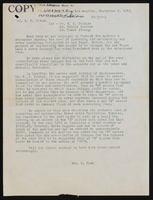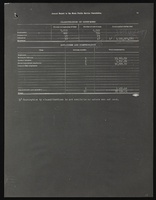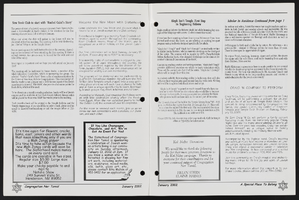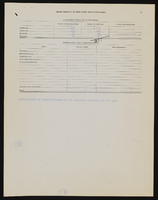Search the Special Collections and Archives Portal
Search Results

Transcript of interview with Toni Clark by Joanne Goodwin, July 2, 1996
Date
Archival Collection
Description
Toni Clark (born Lena Gaglionese) spent her youth in Seattle, Washington where she was born on April 4, 1915 to Angelene and Salvatore Gaglionese. Her father and mother moved to the Seattle area when they immigrated to the United States from Naples, Italy years earlier. Salvatore worked as a street cleaner for the city of Seattle and Angelene cared for the house and family until her early death. Toni grew up with three siblings, her father and step-mother, and an uncle and cousins next door. After attending Seattle’s Franklin High School for three years, she left. “I just didn’t like school so I quit,” she said, and spent the next couple of years at home. From these simple origins, Toni became “the first lady of Las Vegas” as some admirers called her, referring to the role she played in the transformation of Las Vegas from a frontier town into a glamorous resort town during the 1950s and 1960s. In 1941, before the Second World War began, Toni traveled to San Diego to visit friends and decided to stay. After a year of caring for a young boy, she moved into the Barbara Worth Hotel which was owned by Wilbur Clark. Clark’s father ran the hotel and suggested that Toni apply for a job at his son’s new bar and restaurant, the Monte Carlo. She had not met Wilbur Clark at the time and her shyness dissuaded her from making the move. Nevertheless, she did apply and went to work as the hostess of the Monte Carlo in downtown San Diego. Wilbur and Toni’s courtship began slowly. He gave her the name Toni, saying she “looked more like a Toni than a Lena,” and she kept it. In 1944, around the time Wilbur Clark relocated to Las Vegas where he had purchased the El Rancho Hotel, the couple married in Reno, Nevada and permanently made Las Vegas their home. Clark’s involvement in Las Vegas clubs and gambling expanded with the Monte Carlo downtown and the Player’s Club on the strip. But his dream to create a luxury resort hotel came to fruition when the Desert Inn opened in 1950. The fifth major property on the strip, the Desert Inn had several features that distinguished it from other places. The Skyroom offered a private club atmosphere for talking, music, and dancing. The Monte Carlo Room served French cuisine. The Doll House provided round-the-clock childcare for children of hotel guests. The Painted Desert Room, the property’s showroom, featured top performers and the Donn Arden Dancers. All these features combined to create a resort that offered guests an exquisite setting for a gambling vacation. Toni Clark had a special place at the heart of the Desert Inn’s social life. She brought a gracious and elegant charm to social events associated with the property. Although she said she was never involved in the business of the hotel-casino, she played a unique role setting a new tone for the enterprise. She entertained guests and dignitaries at the hotel as well as her home; organized fashion shows featuring the top designers of the time for the wives of high-rollers; and created celebrations of special events, notably her husband’s late December birthday, with annual parties. When Wilbur Clark died in 1965, Toni Clark remained active in the city’s social life. She did not disappear as others had, but continued to plan and attend social functions. As part of her service to the community, she took particular pleasure in her work with the Variety Club. She continued to reside in Las Vegas until her death in 2006.
Text

Transcript of interview with Myoung-ja Lee Kwon by Claytee White, September 4, 2004
Date
Archival Collection
Description
Myoung-ja Lee Kwon began her life on the grounds of the Kyongbok Palace in Korea. In a country where education is valued, her father's occupation as a university professor meant that the family was highly honored, thus this palatial space allowed them live in a state of prosperity. But war changed these circumstances and in this interview Kwon vividly explains the family's evolution. In 1965, after graduation from Seoul National University she married and a year later, moved to the United State of America where she earned a Master's degree in Library Science in Provo, Utah. Her first professional position was at the University of Nevada Las Vegas as a cataloguer and after many promotions, became interim dean of UNLV Libraries. In 2001, she took the job as Dean of Libraries at California State East Bay Library, retiring in 2008. Currently, she serves as a special lecturer and discussion leader with the Fulbright Senior Specialist Program. During her 2009 visit to Korea, she pr
Text
M.J. Christensen oral history interview
Identifier
Abstract
Oral history interview with M.J. Christensen conducted by Rick Maggot on October 23, 1974 for the Ralph Roske Oral History Project on Early Las Vegas. Christensen recalls living in Las Vegas, Nevada during the crash of Carole Lombard’s plane and describes local reactions to the early aboveground atomic tests. He also discusses family, religious life, and the Mormon Church. Christensen speaks about his time as the head of the Merchant’s Bureau, president of the Chamber of Commerce, and the president of the Southern Nevada Better Business Bureau. He also discusses being an assemblyman for eight years and serving for four years as a senator in the state of Nevada.
Archival Collection
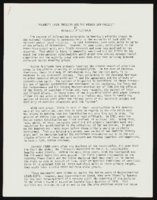
"Minority Labor Problems and the Hoover Dam Project": manuscript draft by Roosevelt Fitzgerald
Date
Archival Collection
Description
From the Roosevelt Fitzgerald Professional Papers (MS-01082) -- Unpublished manuscripts file.
Text


